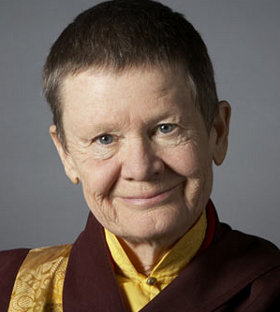Pain is not a punishment; pleasure is not a reward.
As we practice, we begin to know the difference between our fantasy and reality.
It isn’t the things that are happening to us that cause us to suffer; it’s what we say to ourselves about the things that are happening.
Meditation practice isn’t about trying to throw ourselves away or become something better. It’s about befriending who we are already.
We can drop the fundamental hope that there is a better “me” who one day will emerge. We can’t just jump over ourselves as if we were not there.
It’s also helpful to realize that this very body that we have, that’s sitting right here right now… with its aches and it pleasures… is exactly what we need to be fully human, fully awake, and fully alive.
When you begin to touch your heart or let your heart be touched, you begin to discover that it’s bottomless, that it doesn’t have any resolution, that this heart is huge, vast, and limitless. You begin to discover how much warmth and gentleness is there, as well as how much space.
Life
Birth: Pema Chodron was born Deirdre Blomfield-Brown in 1936, in New York City
Realization: While in her mid-thirties, Pema Chodron traveled to the French Alps and encountered Lama Chime Rinpoche, with whom she studied for several years and it was with him that she ultimately made her most profound connection,. She became a novice nun in 1974.
Death: Alive.
Teaching Style: A prolific author, Pema Chodron has conducted workshops, seminars, and meditation retreats in Europe, Australia, and throughout North America. She is resident teacher of Gampo Abbey, a monastery in rural Cape Breton, Nova Scotia, Canada. In recent years, she has spent the summers teaching on the Guide to the Bodhisattva’s Way of Life in Berkeley. Pema was appointed by Sakyong Mipham Rinpoche as “acharya” (senior teacher) in California. She taught as an elementary school teacher for many years
Fame: Pema Chodron is an ordained Buddhist nun in the Tibetan vajrayana tradition, and a teacher in the lineage of Chogyam Trungpa. The goal of her work is the ability to apply Buddhist teachings in everyday life.Pema Chodron is a leading exponent of teachings on meditation and how they apply to everyday life. She is widely known for her charming and down-to-earth interpretation of Tibetan Buddhism for Western audiences. Pema is the resident teacher at Gampo Abbey, Cape Breton, Nova Scotia, the first Tibetan monastery for Westerners and has authored several books, including: The Wisdom of No Escape, Start Where You Are, When Things Fall Apart: Heart Advice for Difficult Times and The Places That Scare You and No Time to Lose.
Legacy: Pema Chodron took Chogyam Trungpa Rinpoche as her root guru at the urging of Lama Chime Rinpoche. While studying with Lama Chime in London his Holiness the Sixteenth Karmapa came to England at that time, and Pema Chodron received her ordination from him.
Teachings
Pema Chodron is a leading exponent of teachings on meditation and how they apply to everyday life.
She told that “Meditation isn’t really about getting rid of thoughts; it’s about changing the pattern of grasping on to things, which in our everyday experience is our thoughts. To begin with, just give up any expectations of yourself. That’s a simple good instruction for how to do Buddhist meditation.”
According to Pema Chodron “Setting boundaries, good boundaries —the intention of that— is to allow for communication to happen. And, barriers are shutting down communication.”
She told that “As long as our orientation is toward perfection or success, we will never learn about unconditional friendship with ourselves, nor will we find compassion.”
She told about laziness that “Rather than feeling discouraged by laziness, we could get to know laziness profoundly. This very moment of laziness becomes our personal teacher.”
According to Pema Chodron, we might think that knowing ourselves is a very ego-centered thing, but by beginning to look clearly and honestly at ourselves, we begin to dissolve the walls that separate us from others.
Her most straightforward advice on how to discover your true nature is ” practice not causing harm to anyone—neither yourself nor others—and every day, do what you can to help.”
According to Pema Chodron, love and compassion are like the weak spots in the walls of ego. If we connect with even one moment of the good heart of bodhicitta and cherish it, our ability to open will gradually expand.

